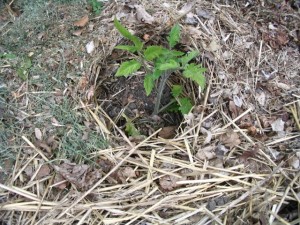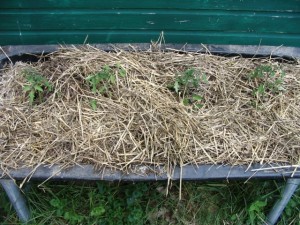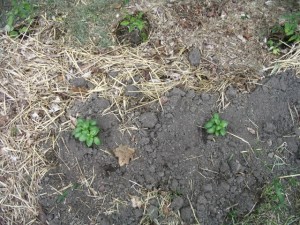If you have read more than a couple entries on our site, you’ll have realized that we are mulch advocates. We talk about mulch all the time. Maybe you’re wondering what exactly we mean by mulch. Maybe you are wondering, “Where do I buy mulch and how much should I get?”

The answer to those questions is “No.” “No, no, no, no, no.”
Basically, we get 90% of our mulch from three FREE sources:
1. We “harvest” mulch when we cut the lawn. We don’t use weedkillers or sprays of any sort on our lawn so we use our grass clippings as mulch for our garden.
2. We “harvest” mulch when we rake leaves in the fall. We put a thick layer of leaves on the garden beds in the fall. We have also stored leaves over winter in yard bags kept in the barn or plastic garbage cans with tight fitting lids. It’s only a little effort for keeping leaves dry. They make a wonderful mulch come spring. (We also help ourselves to other people’s piles from the street on occasion.) We came into possession of a leaf shreadder a couple seasons back and we do run leaves through it to make a finer mulch from time to time.
3. We watch for FREE mulch sources. Our big score over the Memorial Weekend was a listing of 7 bales of straw on our local freecycle group. (That the straw was damp and therefore very heavy was part of its FREE charm!) Good portions of our gardens were treated to a thick layer of straw mulch.

Alas, not everything can be found for free so…
4. If we must buy mulch, we go for the most practical types.
We love cedar chips (not bark or shredded stuff) for mulching around our perennials. Cedar chips are slow to decay, weighty enough not to wash around in the rain, and aesthetically appealing. Their scent is lovely and mild, and rumored to discourage disease and pests. Cedar chips are not cheap, but they are long-lasting.
We also favor straw, even if we have to pay for it. We’ve shopped around a bit and found prices from $3.00 to $5.00 in our area. The less expensive prices can be found further out of town, but with gas prices rising, the near source could prove to be less expensive in the long run.

I’ve grown fond of the rustic colors and textures of mulch on our garden beds over time. Mulch helps keep moisture in the beds so less watering is needed. Mulch adds nutrients to the soil as it breaks down. Most importantly, mulch– a thick mulch like you see in the pictures– helps keep down weeds in the garden. All these benefits from mulch– priceless!



Aw, my baby, winter-sown tomatoes are just the size of yours! I can never get enough leaves… I have been known to curb shop for them in fall! 🙂
~ Monica
Maybe I should have added a ruler for some scale in the first picture!
As Jim says, the tomatoes are just brooding right now in the cool weather. They’ll be much happier and bigger when it starts warming up!
Can one over mulch?